高三英语语法课件之情态动词
图片预览
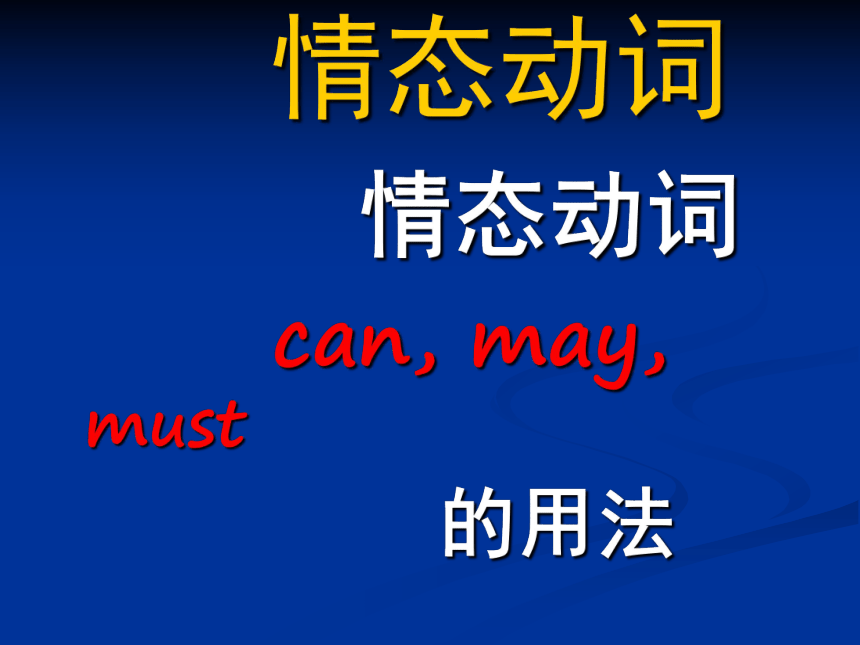
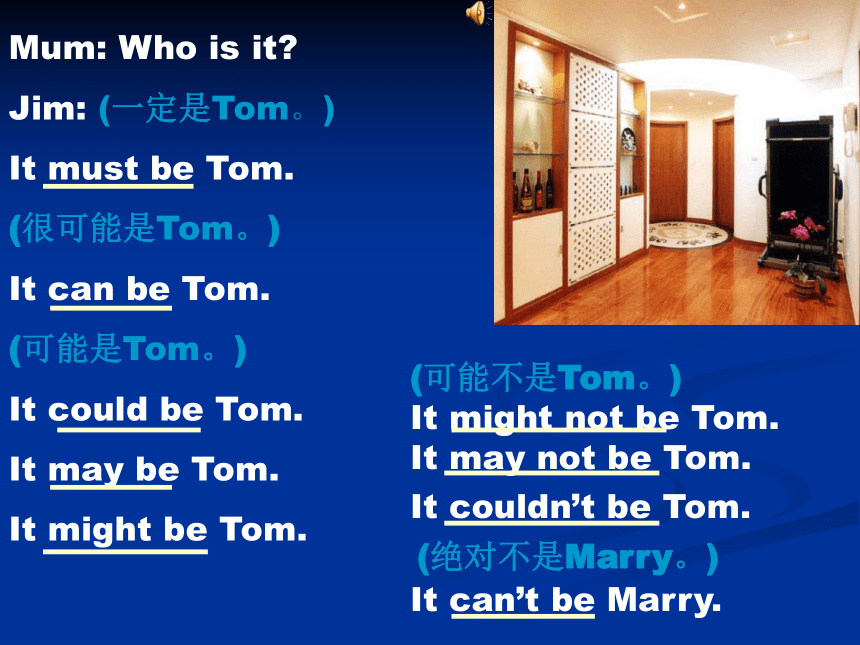


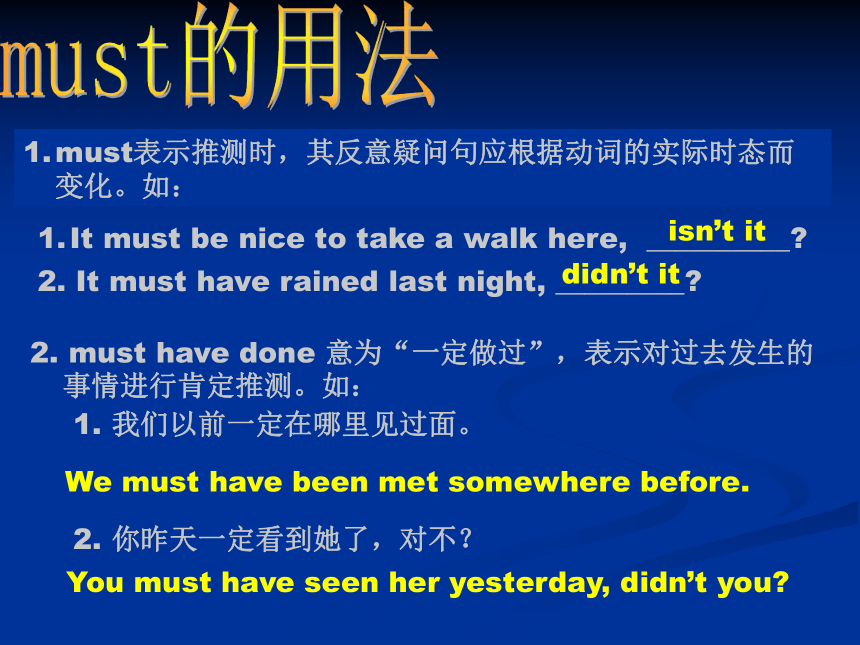

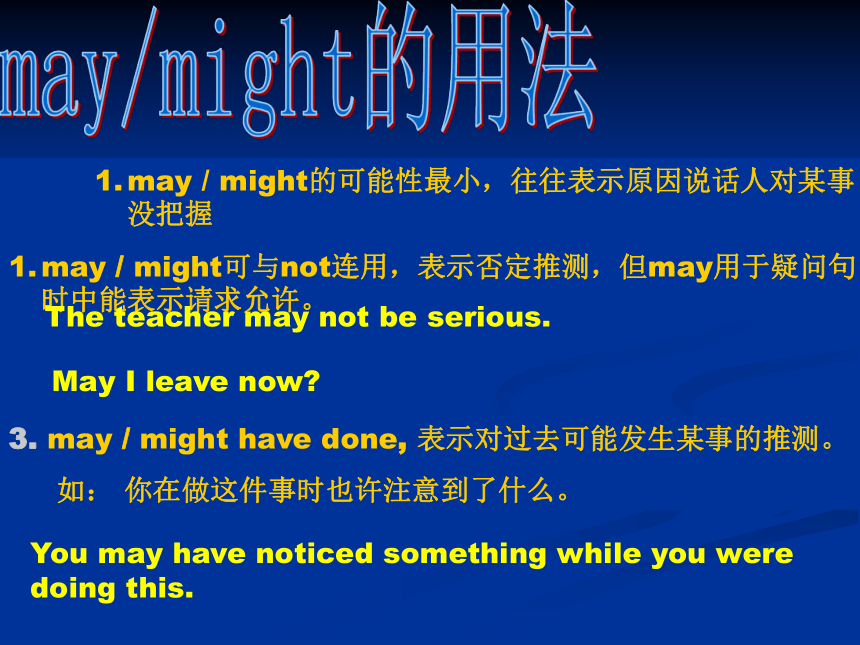


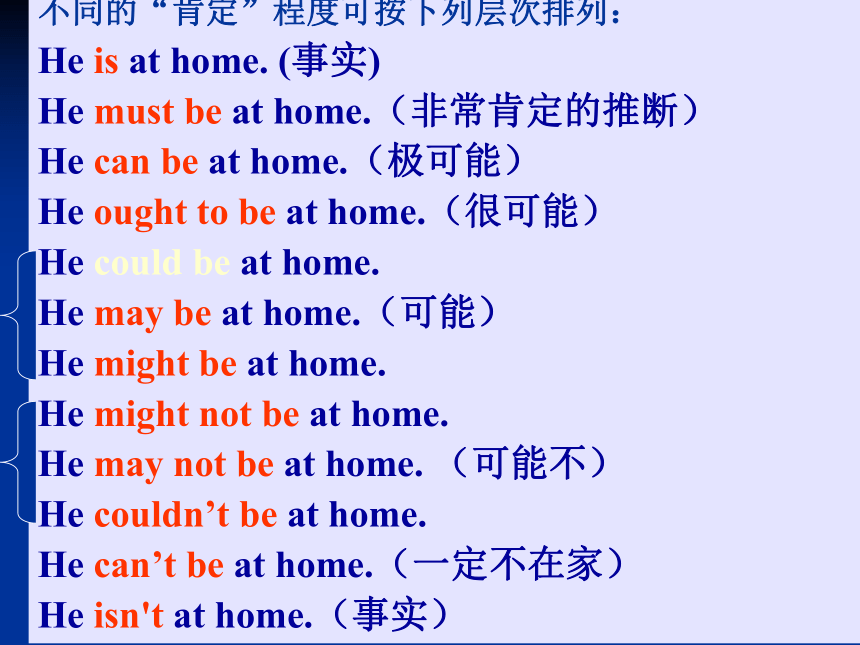


文档简介
课件34张PPT。 情态动词 情态动词
can, may, must
的用法(绝对不是Marry。)(可能不是Tom。)
It might not be Tom.
It may not be Tom.
Mum: Who is it?
Jim: (一定是Tom。)
It must be Tom.
(很可能是Tom。)
It can be Tom.
(可能是Tom。)
It could be Tom.
It may be Tom.
It might be Tom.
It can’t be Marry.It couldn’t be Tom.Modal Verbs (3)mustcan / couldmay / mightquite sure: canpossible: could, may or might.Very sure of:must
can’tHe must be in, for the light is on.
The room is locked. He can’t be in.Playing football can be very interesting.mustn’tDo you think that you could climb that tree?
Do you have a friend who may / might lend you some jewellery?
表示推测——情态动词的重要用法.肯定的推测
可能的推测
否定的推测
疑问的推测must 对将来 对现在 对过去情态动词may, might can’t,
couldn’tcan, could + V. + V. + have done
常见must be + be doing + V. + V. + have done
+ be doing
可以用not表示“可能不”
+V. + V. + have done
+ be doing+ V. + V. + have done
+ be doing2. It must have rained last night, _________?It must be nice to take a walk here, __________?must的用法must表示推测时,其反意疑问句应根据动词的实际时态而变化。如: isn’t it didn’t itWe must have been met somewhere before.You must have seen her yesterday, didn’t you?2. must have done 意为“一定做过”,表示对过去发生的事情进行肯定推测。如:1. 我们以前一定在哪里见过面。2. 你昨天一定看到她了,对不?can / could 的用法Can / could表推测时,其反间疑句也是根据动词的实际时态而变化。如:你不可能当真的,对不?
You can’t be serious, are you?
2. can / could 可与not连用,表示否定推测,也可用于疑问句 can / could have done
See who’s there! _____ it be Mary?
John _____be a basketball player. He’s much too short.
Where is Jane? Where _____ she have gone?
3. can / could have done,还表示“本来能够做而没有做”
如: 你本来可以来早点的。You could have come earlier.may/might的用法may / might的可能性最小,往往表示原因说话人对某事没把握
may / might可与not连用,表示否定推测,但may用于疑问句时中能表示请求允许。The teacher may not be serious.May I leave now?3. may / might have done, 表示对过去可能发生某事的推测。
如: 你在做这件事时也许注意到了什么。You may have noticed something while you were doing this.
I am not sure whether he will come or not. He must come tonight.
He mustn’t be an American because he can’t speak English at all.
I tried to call him at the office, but there is no reply. He can be at home.
--- Is John coming by train?
--- He should, but he ____ not. He likes driving his car.
a. must b. can c. need d. may
5. A left luggage office is a place where bags ____ be left for a short time, especially at a railway station.
a. should b. can c. must d. will6. My English-Chinese dictionary has disappeared. Who ____ have taken it?
a. should b. must c. could d. would
7. My sister met him at the Grand Theater yesterday afternoon, so he ______ the lecture.
a. couldn’t have attended
b. needn’t have attended
c. mustn’t have attended
d. shouldn’t have attended
8. ---- Could I borrow your dictionary?
---- Yes, of course you ____. (NMET1992)
a. might b. will c. can d. should 不同的“肯定”程度可按下列层次排列:
He is at home. (事实)
He must be at home.(非常肯定的推断)
He can be at home.(极可能)
He ought to be at home.(很可能)
He could be at home.
He may be at home.(可能)
He might be at home.
He might not be at home.
He may not be at home. (可能不)
He couldn’t be at home.
He can’t be at home.(一定不在家)
He isn't at home.(事实) 情态动词 must,haveto,have got to 的用法你 去睡一觉。
2. 你 邀请他。
3. 你 照你父母的话办。
4. 你 抽这么多的烟。You’d better get some sleep.You’d better not invite him.You should do what your parents tell you.You oughtn’t to smoke so much.最好最好不应该不应该必须不许不得不不必要You must get some sleep.You mustn’t invite him.You have to do what your parents tell you.You haven’t got to smoke so much.Model verbs (Ⅱ)musthave to have got tomust not / mustn’tdon’t have to haven’t got to / hasn’t got to Must sb…?Do / Does sb. have to …?Have / Has sb. to …?(必须、应当)(必须、不得不)表示义务、命令或必要,后面接不还to的动词学定式。
Soldiers must obey orders.
We must keep our word.
2. must 用在否定句结构中表示“不允许、禁止”
He must not leave his room.
You mustn’t smoke in the office.
3. must用在一般疑问句中,肯定回答用must,否定回答用needn’t 或don’t have to
—— Must I hand it in before five?
—— No, you _________________________.
—— Yes, you ______________. you needn’t. / don’t have to you mustmust的用法have to和have got to 的用法have to 由have + to组成。因此具有have的各种时态。
He is an invalid and has to have a nurse.
She knew what she had to do.
I shall have to reconsider my position.
He is always having to exercise judement.
2. 在口语中,have got to 也可以表示义务和需要, 与have to 基本同义。
He has got to go right now.
He hasn’t got to go just yet.must和have to的区别含义不同:
must 表示说话人的主观思想,强调个人意志和主观的决心。
have to侧重于客观上的必要,强调客观条件作用的结果。
You must do it now.
I have to go now.3. 否定含义不同
在否定句中, have to表示不需要,must则表示不允许。
You don’t have to go there.
You mustn’t go there.2. 适用时态不同
must 只能用于一般现在时和一般过去时,(在间接引语中)
have to 可用于更多的场合。
She said she must do well in her English.ExercisesDon’t be late again. You ____ be here on time.
A. may B. can C. must D. needn’t
You ___ do it even if you don’t want to.
A. can’t B. mustn’t C. needn’t D. have to
3. —— Must I take a bus?
—— No, you ___. You can walk from here.
A. mustn’t B. don’t
C. don ‘t have to D. had better not to
4. —— It is rather cold here. Shall we light a fire?
—— No, we ___, because things here are easy to catch fire.
A. won’t B. can’t C. mustn’t D. needn’t
情态动词典型例题专练
1.-----There were already five people in the car but they managed to take me as well.
-----It ____a comfortable journey. ( )
can't be
B. shouldn't be
C. mustn't have been
D. couldn't have been
D2. Johnny, you ______play with the knife, you ____hurt yourself. ( )
won't ; can't
mustn't ; may
C. shouldn't ; must
D. can't ; wouldn'tB
3. The fire spread through the hotel very quickly but everyone _____get out. ( )
had to
B. would
C. could
D. was able toD4. ------When can I come for the photos ? I need them tomorrow afternoon.
-----They _____be ready by 12 : 00 . ( )
A. can B. should
C. might D. need
B
5. With so much work on hand, you ____to see the game last night. ( )
mustn’t go
B shouldn’t go
C. could have gone
D. shouldn’t have goneD6.They are disappointed at the English party. They say that it ___better organized. ( )
had been
B. had to be
C. must have been
D. could have been
D
7.She must have forgotten about the class _______? ( )
doesn’t she
B. mustn’t she
C. hasn’t she
D. won’ t she
C8. See who’s there ! _______ it be Mary ?
May
Must
Can
willC9.Jenny ____with him at that time, for I was having dinner with her in my home. ( )
can’t have been
B. mustn’t have been
C. must be
D. may be
A
10.Tom’s father promised, “You ___have a new computer if you pass the coming examination,” ( )
can
B. should
C. shall
D. may
C11.---- Did you walked home by yourself last night ?
---- Yes, I did. But I think I _____. ( )
needn’t
B. shouldn’t
C. may not have
D. needn’t haveD
12.----Would you change this bucket for another ? It ______ hold water.
----- OK. I’m really sorry.
won’t
can’t
didn’t
doesn’tA13. You ought to have helped him with his English, ____you ?
A. won’t you
B. ought not you
C. shouldn’t you
D. wouldn’t you
C14.--- I though I ____something burning. ( )
---Really ?
smelled
B. was smelling
C. could smell
D. might smell
C15. She _____out alone at night. ( )
dare not to go
B. dares not go
C. doesn’t dare to go
D. doesn’t dares goC
can, may, must
的用法(绝对不是Marry。)(可能不是Tom。)
It might not be Tom.
It may not be Tom.
Mum: Who is it?
Jim: (一定是Tom。)
It must be Tom.
(很可能是Tom。)
It can be Tom.
(可能是Tom。)
It could be Tom.
It may be Tom.
It might be Tom.
It can’t be Marry.It couldn’t be Tom.Modal Verbs (3)mustcan / couldmay / mightquite sure: canpossible: could, may or might.Very sure of:must
can’tHe must be in, for the light is on.
The room is locked. He can’t be in.Playing football can be very interesting.mustn’tDo you think that you could climb that tree?
Do you have a friend who may / might lend you some jewellery?
表示推测——情态动词的重要用法.肯定的推测
可能的推测
否定的推测
疑问的推测must 对将来 对现在 对过去情态动词may, might can’t,
couldn’tcan, could + V. + V. + have done
常见must be + be doing + V. + V. + have done
+ be doing
可以用not表示“可能不”
+V. + V. + have done
+ be doing+ V. + V. + have done
+ be doing2. It must have rained last night, _________?It must be nice to take a walk here, __________?must的用法must表示推测时,其反意疑问句应根据动词的实际时态而变化。如: isn’t it didn’t itWe must have been met somewhere before.You must have seen her yesterday, didn’t you?2. must have done 意为“一定做过”,表示对过去发生的事情进行肯定推测。如:1. 我们以前一定在哪里见过面。2. 你昨天一定看到她了,对不?can / could 的用法Can / could表推测时,其反间疑句也是根据动词的实际时态而变化。如:你不可能当真的,对不?
You can’t be serious, are you?
2. can / could 可与not连用,表示否定推测,也可用于疑问句 can / could have done
See who’s there! _____ it be Mary?
John _____be a basketball player. He’s much too short.
Where is Jane? Where _____ she have gone?
3. can / could have done,还表示“本来能够做而没有做”
如: 你本来可以来早点的。You could have come earlier.may/might的用法may / might的可能性最小,往往表示原因说话人对某事没把握
may / might可与not连用,表示否定推测,但may用于疑问句时中能表示请求允许。The teacher may not be serious.May I leave now?3. may / might have done, 表示对过去可能发生某事的推测。
如: 你在做这件事时也许注意到了什么。You may have noticed something while you were doing this.
I am not sure whether he will come or not. He must come tonight.
He mustn’t be an American because he can’t speak English at all.
I tried to call him at the office, but there is no reply. He can be at home.
--- Is John coming by train?
--- He should, but he ____ not. He likes driving his car.
a. must b. can c. need d. may
5. A left luggage office is a place where bags ____ be left for a short time, especially at a railway station.
a. should b. can c. must d. will6. My English-Chinese dictionary has disappeared. Who ____ have taken it?
a. should b. must c. could d. would
7. My sister met him at the Grand Theater yesterday afternoon, so he ______ the lecture.
a. couldn’t have attended
b. needn’t have attended
c. mustn’t have attended
d. shouldn’t have attended
8. ---- Could I borrow your dictionary?
---- Yes, of course you ____. (NMET1992)
a. might b. will c. can d. should 不同的“肯定”程度可按下列层次排列:
He is at home. (事实)
He must be at home.(非常肯定的推断)
He can be at home.(极可能)
He ought to be at home.(很可能)
He could be at home.
He may be at home.(可能)
He might be at home.
He might not be at home.
He may not be at home. (可能不)
He couldn’t be at home.
He can’t be at home.(一定不在家)
He isn't at home.(事实) 情态动词 must,haveto,have got to 的用法你 去睡一觉。
2. 你 邀请他。
3. 你 照你父母的话办。
4. 你 抽这么多的烟。You’d better get some sleep.You’d better not invite him.You should do what your parents tell you.You oughtn’t to smoke so much.最好最好不应该不应该必须不许不得不不必要You must get some sleep.You mustn’t invite him.You have to do what your parents tell you.You haven’t got to smoke so much.Model verbs (Ⅱ)musthave to have got tomust not / mustn’tdon’t have to haven’t got to / hasn’t got to Must sb…?Do / Does sb. have to …?Have / Has sb. to …?(必须、应当)(必须、不得不)表示义务、命令或必要,后面接不还to的动词学定式。
Soldiers must obey orders.
We must keep our word.
2. must 用在否定句结构中表示“不允许、禁止”
He must not leave his room.
You mustn’t smoke in the office.
3. must用在一般疑问句中,肯定回答用must,否定回答用needn’t 或don’t have to
—— Must I hand it in before five?
—— No, you _________________________.
—— Yes, you ______________. you needn’t. / don’t have to you mustmust的用法have to和have got to 的用法have to 由have + to组成。因此具有have的各种时态。
He is an invalid and has to have a nurse.
She knew what she had to do.
I shall have to reconsider my position.
He is always having to exercise judement.
2. 在口语中,have got to 也可以表示义务和需要, 与have to 基本同义。
He has got to go right now.
He hasn’t got to go just yet.must和have to的区别含义不同:
must 表示说话人的主观思想,强调个人意志和主观的决心。
have to侧重于客观上的必要,强调客观条件作用的结果。
You must do it now.
I have to go now.3. 否定含义不同
在否定句中, have to表示不需要,must则表示不允许。
You don’t have to go there.
You mustn’t go there.2. 适用时态不同
must 只能用于一般现在时和一般过去时,(在间接引语中)
have to 可用于更多的场合。
She said she must do well in her English.ExercisesDon’t be late again. You ____ be here on time.
A. may B. can C. must D. needn’t
You ___ do it even if you don’t want to.
A. can’t B. mustn’t C. needn’t D. have to
3. —— Must I take a bus?
—— No, you ___. You can walk from here.
A. mustn’t B. don’t
C. don ‘t have to D. had better not to
4. —— It is rather cold here. Shall we light a fire?
—— No, we ___, because things here are easy to catch fire.
A. won’t B. can’t C. mustn’t D. needn’t
情态动词典型例题专练
1.-----There were already five people in the car but they managed to take me as well.
-----It ____a comfortable journey. ( )
can't be
B. shouldn't be
C. mustn't have been
D. couldn't have been
D2. Johnny, you ______play with the knife, you ____hurt yourself. ( )
won't ; can't
mustn't ; may
C. shouldn't ; must
D. can't ; wouldn'tB
3. The fire spread through the hotel very quickly but everyone _____get out. ( )
had to
B. would
C. could
D. was able toD4. ------When can I come for the photos ? I need them tomorrow afternoon.
-----They _____be ready by 12 : 00 . ( )
A. can B. should
C. might D. need
B
5. With so much work on hand, you ____to see the game last night. ( )
mustn’t go
B shouldn’t go
C. could have gone
D. shouldn’t have goneD6.They are disappointed at the English party. They say that it ___better organized. ( )
had been
B. had to be
C. must have been
D. could have been
D
7.She must have forgotten about the class _______? ( )
doesn’t she
B. mustn’t she
C. hasn’t she
D. won’ t she
C8. See who’s there ! _______ it be Mary ?
May
Must
Can
willC9.Jenny ____with him at that time, for I was having dinner with her in my home. ( )
can’t have been
B. mustn’t have been
C. must be
D. may be
A
10.Tom’s father promised, “You ___have a new computer if you pass the coming examination,” ( )
can
B. should
C. shall
D. may
C11.---- Did you walked home by yourself last night ?
---- Yes, I did. But I think I _____. ( )
needn’t
B. shouldn’t
C. may not have
D. needn’t haveD
12.----Would you change this bucket for another ? It ______ hold water.
----- OK. I’m really sorry.
won’t
can’t
didn’t
doesn’tA13. You ought to have helped him with his English, ____you ?
A. won’t you
B. ought not you
C. shouldn’t you
D. wouldn’t you
C14.--- I though I ____something burning. ( )
---Really ?
smelled
B. was smelling
C. could smell
D. might smell
C15. She _____out alone at night. ( )
dare not to go
B. dares not go
C. doesn’t dare to go
D. doesn’t dares goC
